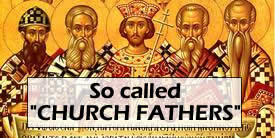ESPAÑOL version HERE : English PDF
.
THE TRUTH ABOUT "CHURCH FATHERS", SUNDAY AND THE CATHOLIC CHURCH
 Mention 'Church fathers' today and instead of people thinking of Jesus' apostles, or even God's Old Testament leaders and prophets, a lot of
people point to the Roman Catholic 'fathers'. Do a search on the internet and instead of seeing the great names from the Bible, you will see
names like Origen, Clement of Rome, Ignatius, and Augustine. But there is a big difference between the true 'church fathers', the apostles
of Jesus Christ, and the later so called 'fathers' as named above.
Mention 'Church fathers' today and instead of people thinking of Jesus' apostles, or even God's Old Testament leaders and prophets, a lot of
people point to the Roman Catholic 'fathers'. Do a search on the internet and instead of seeing the great names from the Bible, you will see
names like Origen, Clement of Rome, Ignatius, and Augustine. But there is a big difference between the true 'church fathers', the apostles
of Jesus Christ, and the later so called 'fathers' as named above.
The apostles of Christ and writers of the New Testament taught a simple gospel that is clearly revealed to all who will believe. But the so called 'church fathers' that many people look to today replaced the simplicity of the gospel message with a mysterious and hidden message that could only be interpreted by themselves and the leaders of the 'visible church'.
Many eminent theologians of Christian history speak against accepting the writings of the so called apostolic fathers with any authority.
To get an example of the kind of spirit that was driving these so called church fathers, you only need look at Augustine. Once, while addressing some non-Catholic monks from North Wales who would not bow to his and the Roman Church's requests, he shouted ... "if you will not join with us in unity, you shall from enemies suffer the vengeance of death." (Killen, The Old Catholic Church, p.276-7)
"A phenomenon singular in its kind, is the striking difference between the writings of the apostles and the writings of the apostolic fathers ... The writings of the so called apostolic fathers have unhappily, for the most part, come down to us in a condition very little worthy of confidence ... which aimed to crush the free spirit of the gospel." (Neander, General History of the Christian Religion and Church, Vol.1, p.657)
"To the common people, the principal truths of Christianity were explained in their purity and simplicity, and all subtilties were avoided; nor were weak and tender minds overloaded with a multitude of precepts. But in their schools, and in their books, the doctors who cultivated literature and philosophy and especially those of Egypt, deemed it elegant and exquisite, to subject divine wisdom to the scrutiny of reason, or rather to bring under the precepts of their philosophy, and to examine metaphysically, the nature of the doctrines taught by Christ. At the head of this class of divines was Origen ... he maintained that under the things there expressed, there was contained a hidden and concealed sense, which was much to be preferred to the literal meaning. And this hidden sense it is that he searches after in his commentaries, ingeniously indeed, but perversely, and generally to the entire neglect and contempt to the literal meaning. Innumerable expositors in this and the following centuries pursued the method of Origen." (Mosheim, Institutes of Ecclesiastical History, BOOK I, CENTURY III, PART II, CHAP. III)
"If we turn to the fathers with the hope that now at last we shall enter the region of unimpeachable methods and certain applications, we shall be disappointed. I would earnestly ask not to be misunderstood ... There are but few of them whose pages are not rife with errors - errors of method, errors of fact, errors of history, of grammer, and even of doctrine ... The earliest fathers and apologists add little or nothing to our understanding of scripture ... We turn to them in vain for the justification of any claim to the possession of an infallible tradition." (Farrar, History of Interpretation, p.162-165)
"When God's Word is by the Fathers expounded, construed, and glossed, then, in my judgment, it is even as when one strains milk through a coal-sack, which must needs spoil and make the milk black; God's Word of itself is pure, clean, bright and clear; but, through the doctrines, books, and writings of the Fathers, it is darkened, falsified, and spoiled." (Martin Luther, Table Talk, p.228)
"As to the fathers in general ... of these we may safely state, that there is not a truth in the most orthodox creed, that cannot be proved by their authority, nor a heresy that has disgraced the Romish Church, that may not challenge them as its abettors. In points of doctrine, their authority is, with me, nothing. The Word of God alone contains my creed." (Adam Clarke, Commentary on Proverbs 8)
It was Satan's desire to replace the clear, Divinely inspired writings of the prophets of God and apostles of Christ, with writings of men whom confused the clear gospel truth, and replaced them with 'mysteries' that only the Church leaders could interpret. This enabled Satan to lock the people up in a perpetual deception, causing them to look to 'church tradition' over the Word of God itself. And I have personally had this experience myself talking to pastors of so called EVANGELICAL churches. After showing them truths from God's Word, they would tell me ... "Ok, I will go and check my books [books of the 'church fathers'] to see what they say and get back to you" And these are pastors of non Roman Catholic churches!